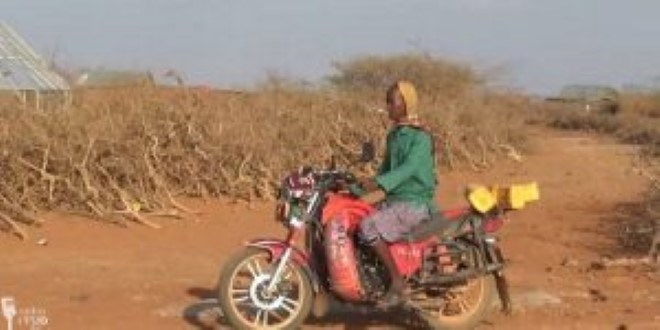
Wednesday December 1, 2021

Ibrahim Abdirashid Dahir’s camel milk trade stopped when pastoralists left the area/Mohamoud Abdirashid/Ergo
(ERGO) – Ibrahim Abdirashid Dahir is supporting his family of four on whatever he can make from one or two passenger trips a week on his motorbike between his village of Qooney and the town of Luq in southern Somalia’s Gedo region.
His camel milk sales, like most other trade in the area, have been halted by the harsh drought that has caused the death of many animals and forced pastoralists to migrate in search of water and pasture for their remaining herds.
He used to use his motorbike to travel to rural areas buying nine to 18 litres of camel milk from herders that he would sell to residents in the village, making a profit of 25-36 dollars per day. He bought a litre at $2.5 from the pastoralists and sold it at $4.5 in the village.
But the pastoralists have had to move away to save their own livelihoods.
“The last camels that used to feed on the toothbrush plants left the area this month [November]. I’m not bringing milk any more now,” said Ibrahim.
The pastoralists also used to pay Ibrahim to buy them food stuff from the village and deliver it to them in the rural areas. He charged $5-$15 for the delivery, depending on the distance from Qooney.
Nobody has any money these days in the village. Ahmed Abdullahi Abdirahman, a shop owner in Qooney, said he is owed $5,000 by 17 families who have been buying food from his shop on credit. He used to have 50 families regularly shopping at his store, but there are only 12 families receiving support from their relatives abroad who have been shopping there recently.
“I asked for my money back from the people in debt to me. They told me this is not the time to call in debts. I understand them and I have just stopped asking because there is nothing else I can do,” said Ahmed, who closes the shop in the evening without making any sales the whole day.
Ahmed, a father of six, is worried about his own living and does not know how he will repay the $7,250 he owes the larger stores in Luq where he bought his stocks. The wholesalers will not give him any more goods without paying off his debt.
“If you stock food now, everyone wants to buy it on credit. You won’t get any money as people are hungry,” he said. “The drought has robbed us!”
The 300 livestock brokers based in Luq livestock market are also out of work. Ahmed Haji Abdi has not sold a single animal since the start of November, as none are being brought to the market.
“I just come to the market anyway for the sake of it, but there is nothing here. I can’t go back home because I don’t have anything to provide for my children. To be honest with you, I don’t even have money to buy a cup of tea now,” Ahmed told Radio Ergo dejectedly.
Ahmed, a father of five, used to make from 300,000 up to two million Somali shillings ($11-$74), when the livestock market was operating.